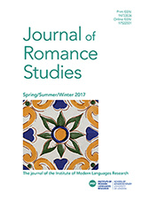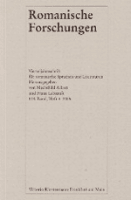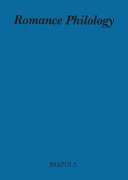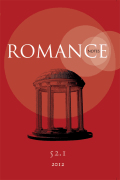
Journal of Romance Studies
Scope & Guideline
Fostering Scholarly Dialogue in Romance Disciplines
Introduction
Aims and Scopes
- Interdisciplinary Cultural Studies:
The journal emphasizes the intersection of literature, history, and cultural studies, exploring how these disciplines inform and shape each other. - Focus on Gender and Identity:
A consistent theme in the journal is the examination of gender roles, women's narratives, and LGBTQ+ perspectives, revealing how these identities are constructed and represented in various cultural contexts. - Memory and Trauma Studies:
The exploration of collective and personal memory, particularly in relation to historical trauma, is a core focus. This includes the impact of colonialism, war, and migration on cultural narratives. - Culinary and Material Culture:
The journal also investigates the connections between food, culture, and identity, examining how culinary practices reflect and shape social and political dynamics. - Visual and Performative Arts:
A significant contribution of the journal is its engagement with visual culture, film, and performance, analyzing how these mediums convey complex cultural messages and historical narratives.
Trending and Emerging
- Intersectionality and Multidimensional Identity:
There is a growing trend towards exploring intersectional identities, where race, gender, sexuality, and class intersect, particularly in contemporary narratives. - Postcolonial and Decolonial Studies:
Recent publications increasingly address postcolonial and decolonial themes, reflecting a critical engagement with legacy of colonialism and its impact on cultural identities. - Migration and Diaspora Narratives:
The journal is seeing an increase in works that focus on migration and diaspora, examining how these experiences shape individual and collective identities in a globalized world. - Digital Humanities and New Media:
Emerging themes in digital humanities and the impact of new media on cultural production and consumption are becoming more prominent, as the journal explores how technology influences narratives and identities. - Ecocriticism and Environmental Humanities:
There is a noticeable rise in ecocritical perspectives, reflecting concerns about environmental issues and the representation of nature in literary and cultural texts.
Declining or Waning
- Traditional Literary Analysis:
There seems to be a waning focus on purely traditional literary analysis, with fewer articles concentrating solely on canonical texts without contextual or interdisciplinary approaches. - Historical Novel Studies:
While historical perspectives remain important, the specific analysis of historical novels as standalone subjects appears to be decreasing, possibly due to a broader interest in contemporary themes and narratives. - Regional Focus on Specific National Literatures:
The journal's previous emphasis on specific national literatures (e.g., Portuguese or Spanish) is less pronounced, indicating a shift towards more global and transnational perspectives.
Similar Journals

REVUE DE LINGUISTIQUE ROMANE
Pioneering Research in Linguistics and CultureREVUE DE LINGUISTIQUE ROMANE, published by the esteemed SOCIÉTÉ LINGUISTIQUE ROMANE, is a prominent academic journal dedicated to the exploration of Romance linguistics. With its ISSN 0035-1458, the journal plays a significant role in advancing knowledge within the fields of linguistics and the history and philosophy of science. Although it does not currently offer Open Access, it provides critical insights and peer-reviewed research that are indispensable for scholars, educators, and students interested in the nuances of Romance languages. The journal, which has seen converged coverage from 2006 to 2017, and then again from 2019 to 2021, is ranked in the third quartile (Q3) across various categories within Scopus, reflecting its established presence in the academic community. As a vital resource for interdisciplinary studies, REVUE DE LINGUISTIQUE ROMANE is instrumental for those seeking to deepen their understanding of linguistic structures, cultural nuances, and the historical development of Romance languages.

REVUE DES LANGUES ROMANES
Illuminating the Cultural Tapestry of Romance LanguagesREVUE DES LANGUES ROMANES is an esteemed academic journal published in France, dedicated to the study of Romance languages, linguistics, and literary theory. With an ISSN of 0223-3711, this journal has transitioned to an Open Access model since 2022, broadening accessibility and encouraging collaborative research across disciplines. It serves as a platform for researchers, professionals, and students to explore the intricacies of language and literature within the broader context of arts and humanities. Notably, REVUE DES LANGUES ROMANES has achieved Q4 quartile rankings in 2023 for its contributions to Archaeology, Linguistics, and Literature, reflecting its commitment to fostering scholarly dialogue, despite its emerging status in the academic landscape. With a focus on interdisciplinary approaches, the journal invites innovative insights and critical analyses that further understanding in these fields, promoting the depth and richness of Romance languages and their cultural implications.

Expressions maghrebines
Unveiling the Depths of Maghreb Literary TheoryExpressions maghrebines, an esteemed journal published by Florida State University, fosters scholarly dialogue in the realm of Literature and Literary Theory, focusing on the vibrant narratives and critical discourses emerging from the Maghreb region. Established in 2002, this journal has become a vital resource for researchers, professionals, and students, illustrating a commitment to exploring contemporary trends in Francophone literature. With an impressive Q3 rank in 2023, it stands within the top echelon of its category, offering insightful analyses and innovative perspectives to enhance academic understanding. Though not an open-access publication, Expressions maghrebines is indispensable for those seeking to delve into the cultural and intellectual currents that shape Maghreb literary landscapes, thus reinforcing its position as a significant contributor to the academic community's exploration of Francophone studies.

Teksty Drugie
Pioneering Research at the Intersection of Literature and TheoryTeksty Drugie is a premier academic journal dedicated to the field of Literature and Literary Theory, published by the Polish Academy of Sciences, Institute of Literary Research. With its issuance beginning in 2008 and extending intermittently to 2020, this journal has been a significant contributor to literary scholarship in Poland and beyond. The journal holds a commendable Q2 ranking in its category for 2023, indicating its influential status amongst peers in the Arts and Humanities realm, and an impressive Scopus rank of #736 out of 934 in the Literature and Literary Theory domain, with a 21st percentile ranking. Researchers and students will find this journal invaluable for its rigorous academic standards and insightful contributions to contemporary literary discourse. While traditionally available through subscription, Teksty Drugie remains an essential resource for those engaged in the study of literature, offering critical theoretical perspectives and a forum for scholarly debate. The journal is located at ul. Nowy Świat 72, Pałac Staszica, Room 1, Warszawa 00-330, Poland.

ROMANISCHE FORSCHUNGEN
Bridging Disciplines: Linguistics Meets LiteratureROMANISCHE FORSCHUNGEN, published by VITTORIO KLOSTERMANN GMBH, stands as a key scholarly journal in the fields of linguistics and literary studies, focusing particularly on Romance languages and literature. With an ISSN of 0035-8126 and an E-ISSN of 1864-0737, this journal is vital for researchers and scholars seeking to explore and advance their understanding of the nuances within Romance language studies. Operating from its base in Frankfurt am Main, Germany, ROMANISCHE FORSCHUNGEN features a robust publication history from 2002 to 2024. While currently categorized in Q4 within both Linguistics and Language and Literature and Literary Theory for 2023, the journal aims to cultivate a scholarly dialogue that bridges these disciplines, fostering an environment for innovative and critical inquiry. Although not an open-access journal, it serves as a crucial resource for professionals and students dedicated to Romance philology and comparative literature.

Anclajes
Diving into the Dynamics of Human ExpressionAnclajes is a prominent academic journal dedicated to the fields of Cultural Studies, Linguistics, and Literature, published by the UNIV NACIONAL LA PAMPA, FAC CIENCIAS HUMANAS. With both print (ISSN 0329-3807) and electronic (E-ISSN 1851-4669) formats, the journal has embraced an Open Access model since 2010, greatly enhancing its accessibility and reach to a global audience. Based in Argentina, Anclajes provides a platform for innovative research and critical discourse, contributing significantly to the understanding of cultural phenomena and literary theories. In recent years, the journal has established itself with a Scopus rank placing it in the top 30% of Literature and Literary Theory and the top 57% of Cultural Studies, as indicated by its quartile rankings for 2023. With issues converging from 2012 to 2024, Anclajes continues to foster scholarly communication and serves as an essential resource for researchers, students, and professionals seeking to explore the dynamism of human culture and expression.

CONFLUENCIA-REVISTA HISPANICA DE CULTURA Y LITERATURA
Connecting Scholars Through Innovative ResearchCONFLUENCIA-REVISTA HISPANICA DE CULTURA Y LITERATURA, published by Colorado State University, is a pivotal academic journal that has been contributing to the fields of Cultural Studies, Literature and Literary Theory, and Visual Arts and Performing Arts since 2002. With its ISSN 0888-6091 and E-ISSN 2328-6962, the journal aims to foster interdisciplinary dialogue and showcase innovative research that bridges literary analysis with cultural phenomena. As highlighted by its impressive rankings, the journal holds a Q3 category in Cultural Studies and Q2 in both Literature and Literary Theory and Visual Arts and Performing Arts, reflecting its significance and the quality of its contributions. Although it currently does not offer open access, the journal remains a respected platform for scholars, providing rich content that engages and inspires further research in the humanities. As it converges years from 2002 to 2024, CONFLUENCIA stands at the forefront of exploring the complexities of Hispanic culture and literature, making it an indispensable resource for researchers, professionals, and students alike.

ROMANCE PHILOLOGY
Connecting Scholars through Passion for Language and LiteratureROMANCE PHILOLOGY is a distinguished academic journal dedicated to the exploration of language, literature, and linguistic theory within the Romance language family. Published by BREPOLS PUBL, it offers a platform for scholars, researchers, and practitioners to disseminate their findings and engage with the latest developments in these fields. The journal's impact factor reflects its standing, positioned within the Q4 category in Linguistics and Language and Q3 in Literature and Literary Theory for 2023, making it an essential resource for those studying Romance philology. Although coverage in Scopus was discontinued in 2021, the journal maintains a commitment to rigorous academic standards and comprehensive peer-review processes. With a broad scope encompassing theoretical and practical aspects of Romance languages and literatures, ROMANCE PHILOLOGY invites contributions that push the boundaries of knowledge and enrich the academic dialogue surrounding these vital areas of study. For those passionate about linguistic and literary pursuits, this journal stands as a significant gateway into the evolving discourse of Romance studies.

ROMANISTISCHE ZEITSCHRIFT FUR LITERATURGESCHICHTE-CAHIERS D HISTOIRE DES LITTERATURES ROMANES
Unraveling the Histories of Literary ExpressionROMANISTISCHE ZEITSCHRIFT FUR LITERATURGESCHICHTE-CAHIERS D HISTOIRE DES LITTERATURES ROMANES, published by Universitätsverlag C Winter Heidelberg GmbH, represents a significant contribution to the field of literary studies, focusing on the intricate histories of Romance literatures. With an ISSN of 0343-379X and an E-ISSN of 2509-7474, this journal strives to foster critical discourse among scholars, professionals, and students interested in literature and literary theory. Although its coverage in Scopus was discontinued in 2018, and it currently lacks open access options, the journal's past contributions have established it as a noteworthy resource, with a Scopus rank that reflects its engagement with the arts and humanities. The journal's unique scope, which spans various periods and styles, encourages interdisciplinary approaches and invites submissions that explore the evolution and impact of Romance literature across cultures. As a critical platform for emerging and established voices in the field, the ROMANISTISCHE ZEITSCHRIFT continues to be a valuable asset for those dedicated to the scholarship of literary history.

ROMANCE NOTES
Unveiling New Horizons in Romance LiteratureROMANCE NOTES is a prominent journal published by the University of North Carolina, dedicated to the study of Literature and Literary Theory. Since its inception in 1975, the journal has evolved to encompass critical and interdisciplinary perspectives on romance languages, examining both classic and contemporary texts. Aiming to bridge scholarly discourse and literary practice, ROMANCE NOTES invites contributions that explore various dimensions of language, culture, and artistic expression, making it an essential resource for researchers, professionals, and students alike. With an established presence in the academic community and a current ranking of Q3 in its category for 2023, it serves as a vital platform for emerging scholarship. The journal, based in Chapel Hill, North Carolina, continues to foster a rich dialogue within the field, offering an invaluable contribution to the understanding of romance languages and their literary significance.